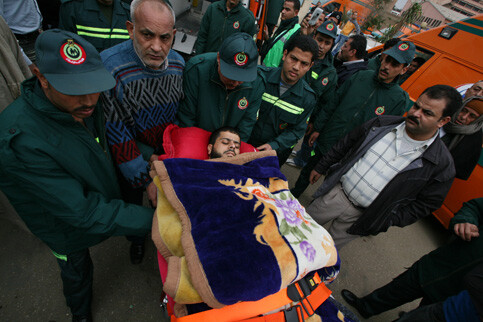The Electronic Intifada 31 December 2008

A Palestinian injured by Israeli air strikes in Gaza arrives at Nasser hospital in Cairo, Egypt, 30 December 2008. (Wissam Nassar/MaanImages)
GAZA CITY, occupied Gaza Strip (IRIN) - In Gaza’s main hospital, the director’s office is under virtual siege, according to an IRIN journalist in Gaza. Relatives of the injured are desperate to get their kin transferred to Egypt for emergency treatment. There is a fear here that the already overstretched healthcare system will collapse if Israel mounts a ground offensive into the tiny coastal strip, home to 1.5 million Palestinians.
As of the night of 30 December the death toll from the Israeli offensive had reached 380, with 1,800 wounded, according to the Gaza health ministry. The UN World Health Organization (WHO) said 30 children and nine women were among the dead and 250 children had been injured.
Fifteen medical patients passed through the Rafah border crossing into Egypt for emergency care on that day, said WHO.
Hospitals in the enclave have been overwhelmed by the trauma cases flowing into emergency rooms since the morning of 27 December.
An official from the Palestinian Medical Relief Society, Aed Yaghi, said at a press conference on 30 December that there were 2,053 hospital beds in Gaza, and warned it was not enough.
“One hundred and fifty patients were brought in at once,” said Khaled Abu-Najar, a staff nurse in al-Shifa’s emergency room. “We lack beds, sterile gloves, sheets, scissors and gauze to treat patients.”
Shortages
He said there were shortages of chest tubes, forceps, artery clamps, ventilators and monitors.
Nearly half of the emergency room staff are volunteers recruited since 27 December, said Abu-Najar.
“We are short of rooms and supplies, we are up to our necks,” said Ramez Zyara, one of nine general surgeons working 24-hour shifts at al-Shifa. The small team treated hundreds of patients on 30 December for crush injuries and severe trauma.
“The buildings are falling on the heads of the patients,” said Zyara.
The intensive care (ICU), burns, orthopedic and surgery units have reached capacity, said al-Shifa hospital director Hussein Ashur, while 10 of the 12 operating rooms are being used for emergency care.
There are 25 life support systems — also used to measure a patient’s blood pressure, temperature, oxygen circulation and heart activity — in the ICU of al-Shifa. “We need at least 25 more,” said Ashur.
He also said there were shortages of dressings, and gauze used in X-ray machines.
“We have not received medical supplies at al-Shifa for three months,” said Ashur.
The first emergency medical aid deliveries reached Gaza on 30 December. Some 90 trucks — 53 supplied by aid agencies — entered via the Kerem Shalom crossing, according to WHO.
Kamal Adwan hospital
Kamal Adwan is the primary hospital serving Jabaliya and Beit Lahiya. Jabaliya, Gaza’s largest refugee camp, is home to 300,000.
The hospital lacks medicine, including basic antibiotics, analgesics and hydrocortisone, said hospital director Bassam Abu-Warda.
“If there is a major Israeli invasion we will collapse,” warned Abu Warda. “On Saturday [27 December] 93 patients came for emergency care; we had to set up make-shift beds.”
Since 27 December Abu-Warda has added 24 beds to the existing 71.
Paramedics at Kamal said they did not have enough staff, medical supplies or ambulances.
Magdi Hatib, 48, witnessed his brother, Akram Hatib, 35, torn apart by burning shrapnel from an Israeli missile on 27 December in the Beach refugee camp of Gaza City, home to Gaza prime minister Ismail Haniyeh.
“He was bleeding on the ground for 15 minutes till we could approach him, fearing a second explosion,” said Magdi. “There were no ambulances, so we took him to al-Shifa hospital by taxi.”
Rafah tunnels bombed
Israel bombed dozens of tunnels in the Rafah area on 30 December, saying they were used by Hamas for smuggling weapons.
Health ministry spokesperson Hamam Nasman said shipments of Egyptian fuel were the only means of running his fleet of ambulances, half of which are not operating due to a lack of spare parts — a result of the border closures by Israel since June 2007 when the elected Hamas government took over in the enclave.
The tunnels have been used to import fuel, cooking gas, medicine and food supplies to circumvent the Israeli blockade.
Residents flee their homes
Meanwhile, residents in Jabaliya and Beit Lahiya were fleeing their homes in anticipation of further bombardments.
“We evacuated our home last night — my wife and our two-year old son Karim,” said Sami Abu Salem, 38, an editor, after the Israeli authorities warned residents the home of a militant leader in the area would be targeted.
“We took basic food items with us and we are still afraid to return,” said Abu Salem.
The Coastal Municipalities Water Utility in Gaza said that if the water supply network is damaged it will be impossible to repair, due to the lack of fuel and spare parts.
Access for aid agencies to Gaza has been severely restricted since the beginning of November. A ground invasion would make matters worse.
This item comes to you via IRIN, a UN humanitarian news and information service, but may not necessarily reflect the views of the United Nations or its agencies. All IRIN material may be reposted or reprinted free-of-charge; refer to the copyright page for conditions of use. IRIN is a project of the UN Office for the Coordination of Humanitarian Affairs.
Related Links


